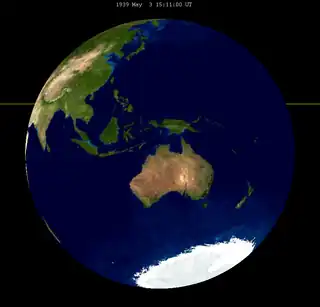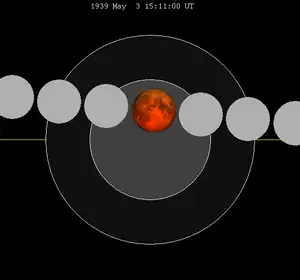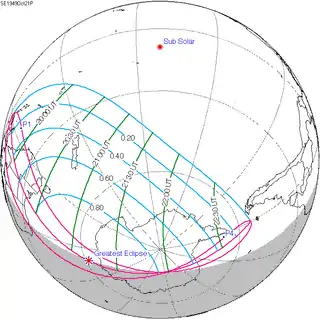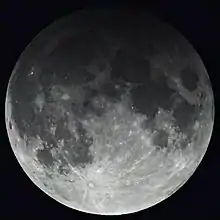
A penumbral lunar eclipse took place on Wednesday, October 16, 1940, the last of three lunar eclipses in 1940.
Visibility

Related lunar eclipses
| Ascending node | Descending node | |||||
|---|---|---|---|---|---|---|
| Saros | Date Viewing |
Type Chart |
Saros | Date Viewing |
Type Chart | |
| 110 | 1937 May 25 |
Penumbral |
115 | 1937 Nov 18 |
Partial | |
| 120 | 1938 May 14 |
Total |
125 | 1938 Nov 07 |
Total | |
| 130 | 1939 May 03 |
Total |
135 | 1939 Oct 28 |
Partial | |
| 140 | 1940 Apr 22 |
Penumbral |
145 | 1940 Oct 16 |
Penumbral | |
Half-Saros cycle
A lunar eclipse will be preceded and followed by solar eclipses by 9 years and 5.5 days (a half saros).[1] This lunar eclipse is related to two partial solar eclipses of Solar Saros 152.
| October 11, 1931 | October 21, 1949 |
|---|---|
 |
 |
See also
Notes
- ↑ Mathematical Astronomy Morsels, Jean Meeus, p.110, Chapter 18, The half-saros
External links
- 1940 Oct 16 chart Eclipse Predictions by Fred Espenak, NASA/GSFC
This article is issued from Wikipedia. The text is licensed under Creative Commons - Attribution - Sharealike. Additional terms may apply for the media files.

_(cropped).jpg.webp)
